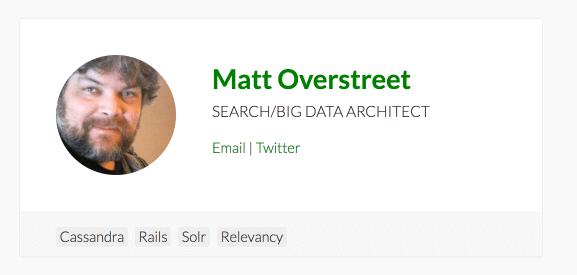For years I’ve been interested in describing what makes someone special by looking at the ambient data that surrounds them. My first big effort was way back in 2008 and was a simple web app and some screen scraping scripts that collected public data about people in Charlottesville, Virginia, and identified folks who are doing “high tech” stuff called HighTechCville. And yes, “high tech” is a rather subjective idea!
Today, as part of making sure that we have the “right people in the right seats” for each of our consulting engagements we have explicit criteria for specific technical fields. These criteria we call Merit Badges, and we have them at various levels for our specific concentrations in Solr, Elasticsearch, Cassandra, and a specialization for Search Relevancy.
I was chatting about our Merit Badge concept with a firm that develops learning paths for non-traditional students and they turned me on to Open Badges:
Get recognition for learning that happens anywhere. Then share it on the places that matter. A digital badge is an online representation of a skill you’ve earned.
I looked at the website and got really excited! This is exactly what I needed was my first thought. We currently have on our About Us page some tags that describe what each member of OSC is an expert in:

How cool would it be if that wasn’t just some static HTML, but actually driven by Open Badges? We could use Open Badges to issue our internally defined Merit Badges, and maybe even offer them out to the world? For example, we have a very specific opinion of what makes a Relevance Engineer, so maybe we make that a public badge that we issue via Open Badges?
And I entered the trough of disillusionment. Open Badges was a brain child of Mozilla Foundation and many others, and there was a lot of initial enthusiasm (dare I say hype even?) in the 2012 to 2015 time frame. However, now it seems like this wonderfully simple of idea of having Badges that are just images that carry some metadata has bogged down in hard things like how do I store Badges from many providers? How do I confirm the Badge means what it says? And the fact that while certain very specific platforms, primarily education related, support it, there isn’t a real simple way of displaying or querying what someone has programmatically. There is a lot of talk about a backpack which lets you store your badges that you collect from many providers, but the initial one by Mozilla is no longer supported!
I played around with Badgr, which is a reference implementation for issueing and tracking badges. However, at the end of the day, what I wanted was a very easy way to display my badges that I had earned. And that apparently is very very difficult! So, as much as it pained me, I ended up just quickly rolling my own simple tracking system for who has what badges.
It seems that Open Badges, like FOAF, and the various Microformats are all struggling because it’s very hard to have distributed information systems where you have multiple contributors and need to trust the data. If only Open Badges, FOAF files, and other distributed informations worked the way DNS does…
However, there is an interesting ray of light. In digging around with Open Badges, I finally wondered if that was how when some passes a Coursera class, it ends up being listed on LinkedIn… And yep, sure enough, I found the right link in Badgr to pop open a screen in LinkedIn to add a certification. You can also do it directly. That is kinda cool! And then I realized that LinkedIn functions as the aforementioned backpack. LinkedIn is the aggregator of all your badges, regardless of who issued them!
So to start putting Open Badges and LinkedIn to the test, I created a Solr Merit Badge badge that is issued by OpenSource Connections in Badgr. I then awarded myself the merit badge ;-). You can now see it on my LinkedIn profile:

Eureka!
I’d love feedback or thoughts from others using Open Badges… Is it worth the integration costs… How will help me make sure the right consultants are on each project? Versus just maintaining an internal spreadsheets… And, is any one interested in a public Search Relevancy certification, powered via Open Badges?
